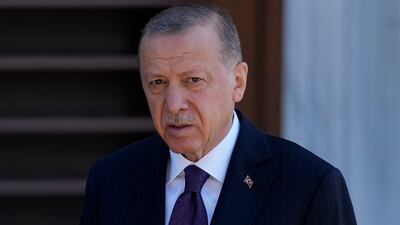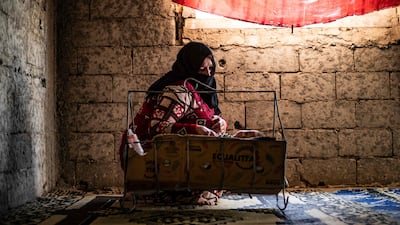Turkey’s President Recep Tayyip Erdogan expressed a wish to meet President Bashar Al Assad had the Syrian leader attended a summit being held in Uzbekistan, a report in Turkey's pro-government Hurriyet newspaper said on Friday.
The move is the latest sign of shifting relations as Turkey has long been a major backer of rebel and anti-government factions in Syria’s more than a decade-long civil war.
Mr Erdogan has previously called Mr Al Assad a terrorist and said there could be no peace in Syria with him in office, while Mr Al Assad has called Mr Erdogan a thief for stealing Syrian land.
But Mr Erdogan's recent comments are a stark contrast to past opinions.
"I wish Assad had come to Uzbekistan, I would have spoken to him. But he can't come there," Mr Erdogan reportedly said at the party meeting.
"He went to war with rebels to maintain his own power. He chose to protect his own power. He thought to protect the areas he controlled. But he couldn't protect large areas," Mr Erdogan said.
Turkish backing has been vital to sustaining Syrian rebels in their last major territorial foothold in the north-west, after Mr Al Assad defeated the insurgency in the rest of the country, aided by Russia and Iran.
The comments came as reports indicate Turkey's intelligence chief has held several meetings with his Syrian counterpart in Damascus over the past few weeks. The move is a sign of Russian efforts to encourage a thaw between states on opposite sides of Syria's war, sources told Reuters.
A regional source aligned with Damascus told Reuters that Hakan Fidan, head of Turkey's National Intelligence Organisation (MIT), and Syrian intelligence chief Ali Mamlouk met as recently as this week in the Syrian capital.
The contacts reflect a Russian policy shift as Moscow steels itself for a protracted conflict in Ukraine and seeks to secure its position in Syria, where its forces have supported Mr Al Assad since 2015, according to two Turkish officials and the regional source.
But, rapprochement faces big complications, including the fate of rebel fighters and millions of civilians, many of whom fled to the north-west to escape Mr Al Assad's rule.
Turkey, a Nato member country, has troops on the ground across the area, which Mr Al Assad considers to be occupying forces.
During the meetings, Mr Fidan ― one of Mr Erdogan's closest confidants ― and Mr Mamlouk evaluated how the two countries' foreign ministers could eventually meet, according to a senior Turkish official and a Turkish security source.
"Russia wants Syria and Turkey to overcome their problems and achieve certain agreements ... which are in the interest of everyone, both Turkey and Syria," the Turkish official told Reuters.
One big challenge is Turkey's desire to include Syrian rebels in any talks with Damascus, the official said.
The Damascus-allied source said Russia had nudged Syria to enter talks as Moscow seeks to nail down its position and that of Mr Al Assad in the event it must redeploy forces to Ukraine. Russia has sustained serious losses in Ukraine over the past week.
The senior Turkish official said Ankara does not want to see Iranian or Iran-backed forces ― already widely deployed in government-controlled parts of Syria ― plugging gaps left by Russian withdrawals.



















